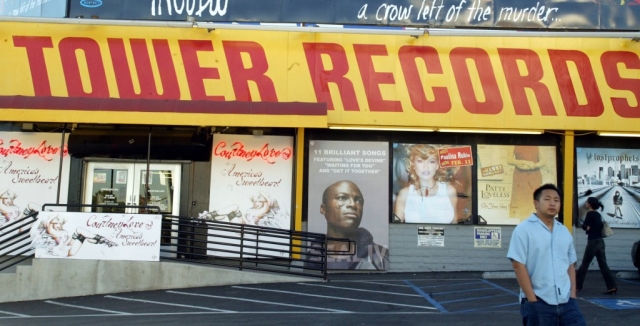
“ Everything we ever did was based on ideas from people in the stores.” Almost every decision has a “seat-of-one’s-pants” feeling, fueled by a massive streak of good luck. He called his managerial style “the Tom Sawyer method of management.” “ I always got someone else to paint the fence,” he says. Solomon explains that every higher-up started out working in the store. Solomon considered his Tower Records employees to be family, and that feeling plays out with the numerous talking heads who populate “All Things Must Pass." People like Steve Gorman, Mark Viducich and the delightfully salty Heidi Cotler discuss their decades long affiliation with the store, starting from their early days as a store clerk to their last days as upper management. Tower Records was born, and since there was nothing else to do in the neighborhood, teenagers flocked to it. Solomon’s dad, Clayton, wanted no part of this, so he sold the business and the extra space to his son. To make money, Solomon decided to sell used records from the jukebox, and when that proved successful, he started selling new records.
#Original tower records movie#
We then meet Solomon, whose dad owned Tower Drugs, a store inside Sacramento’s Tower movie theater. “Five years later, it was bankrupt,” the next title tells us, preparing us for the bitter end of the party to which Hanks invites us.

And just like in life, the piper of harsh adulthood materialized to collect payment on the tune that was never supposed to stop playing.Īn onscreen title at the beginning of “All Things Must Pass” informs us that, in 1999, Tower Records was a billion dollar company. Started in 1960 in Sacramento, Russ Solomon’s business venture began small, then enjoys a period of success buffered by unbelievable decadence and an adolescent brand of fearlessness and perceived invincibility. In fact, Tower’s story has an arc much like human life. The rise and fall of Tower Records is the subject of Colin Hanks’ “All Things Must Pass”, a documentary that inspires long, gauzy gazes back to the carefree, youthful past of viewers of a certain age. It was a heaven filled with vinyl, easily popped cassette tapes and, eventually, the CD’s that unwittingly signaled the downfall of the neighborhood record store.

It was a place where I’d spent far too much money and time, neither of which I regret. I can close my eyes and walk through that store as if I’d been there yesterday, and after I’m done, I can mentally stroll through the layout of Tower Records on West 4 th Street in New York City. Tower Records currently exists solely as an online music store.Anybody who has ever spent time in a record store has memories like this. A documentary on the history of Tower, “All Things Must Pass,” debuted March 2015. The chain, under the weight of Napster and digital sales, finally imploded December 2006 although Solomon attempted a resurgence a few months later, putting up a store on the site of one of Tower’s very first outlets, but that too went away. came online in 1995, making it one of the first online retailers. Solomon’s philosophy was simple and often imitated: Make the store big and fill it with as much product as it could hold. The Japan version of Tower Records opened iun 1979 and soon the chain had stores in places as vast as Hong Kong, the Philippines, Ireland, Israel, Mexico and Canada. He opened Tower Books, Posters and Plants in 1976, next to Tower Records. He named it after his father’s drug store, which shared space with the city’s Tower Theatre and where Solomon first began selling records. “He went right back to the same guys, the same creditors who put him out of business,” Dick Harris, an early employee, told the paper. It began in approximately 1960 – that’s actually when Tower Record Mart went bust and Solomon returned to his original creditors to give him new inventory. Solomon’s famous record company chain stretched across the world, garnering $1 billion in revenue annually. Solomon was synonymous with the Tower Records chain, which he began in Sacramento, which the Bee called “the most famous company in Sacramento history.” His father was apparently dead by the time Patti returned with the drink.

“Ironically, he was giving his opinion of what someone was wearing that he thought was ugly, then asked (his wife) Patti to refill his whisky,” Solomon told the paper.


 0 kommentar(er)
0 kommentar(er)
